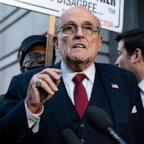NBA free agency Day 11: Rating moves by Lakers, Knicks
— -- On Day 11 of NBA free agency, here's our team-by-team analysis of the major and minor deals.
Updates on each deal will be posted here throughout the day.
All deals listed alphabetically by team.
Atlanta Hawks
1.?Agreed to a reported two-year, $14 million deal with center Dewayne Dedmon
Because Dedmon has a player option on the second season of this contract, I'm not sure I like it for the Hawks even though I like both the player and the salary.
Let's say Dedmon plays as well as Atlanta hopes. In that case, he opts out next summer and the Hawks have only non-Bird rights on him, meaning they could pay him a maximum of 120 percent of his 2016-17 salary without using cap space (or an exception, in the unlikely event Atlanta stays over the cap). Meanwhile, if Dedmon struggles and declines his player option, he'll opt in to what at that point will almost by definition be a bad contract for the Hawks.
Such deals still make sense for contending teams, because they typically mean a player is coming at a lower salary than they expect or desire. For example, Dedmon himself signed a similar one-plus-one deal with the San Antonio Spurs last summer because they could offer him only their room midlevel exception. Though the Spurs got just one season out of Dedmon, they'd surely make that deal again because of the value he provided.
Right now, Atlanta isn't in that position. Most likely, the Hawks will be in the lottery next season. So unless Atlanta is able to flip Dedmon before the trade deadline I'm not sure getting him at a good price will actually do the team much benefit.
This signing might have the most impact on Kentavious Caldwell-Pope, since the Hawks were perhaps the last team that had the combination of cap space and need to plausibly make him a competitive multiyear offer. Now I'd expect Caldwell-Pope to take a one-year deal, with the L.A. Lakers as a likely possibility.
Atlanta does still have $12 million-plus in cap space remaining, not counting any money they saved with Jamal Crawford's buyout. The Hawks will likely target a replacement for Paul Millsap at power forward with the bulk of that room.
Detroit Pistons
1.?Agreed to a reported one-year, $3.3 million deal with forward Anthony Tolliver
This is a return to the Pistons for Tolliver, who played nearly two seasons in Detroit before signing with the Sacramento Kings last summer. Bringing back Tolliver, a stretch-4, seems to signal Tobias Harris will play more small forward this season with the Marcus Morris trade and that Jon Leuer might play more center with the departure of Aron Baynes.
In value terms, Tolliver at $3.3 million is a solid deal for the Pistons. The one question here is whether they might have gotten more value from their biannual exception next summer, when the market for free agents is likely to be tight. (As the name implies, teams can use the biannual exception every other year.) Tolliver's addition probably comes close to completing Detroit's roster. The Pistons have 15 players under contract now, though Michael Gbinije and Eric Moreland have partially guaranteed salaries.
Los Angeles Lakers
1.?Agreed to a reported one-year, $18 million deal with guard Kentavious Caldwell-Pope
Once the Hawks used part of their cap space to sign Dedmon, this seemed like an inevitable outcome. There were no teams left on the market with sufficient cap space and need to offer Caldwell-Pope a long-term deal that would make sense for him, so taking a lucrative one-year deal made sense.
From the Lakers' standpoint, a one-year deal was the way to go. Given the possibility of adding Paul George and LeBron James next season, however remote the latter part of that, adding salary beyond this season would be reckless at best and destructive at worst. And while the Lakers could have split that money among a handful of players, there was no available player better than Caldwell-Pope, my top remaining free agent before he signed.
Adding Caldwell-Pope does mean a bit of a crowd in the backcourt, and the main potential downside of the move is cutting the minutes of rookie Josh Hart, particularly if the Lakers end up adding a backup point guard and Jordan Clarkson serves primarily as Caldwell-Pope's backup. That's a worth risk taking to be more competitive this season, particularly with the Lakers already out their draft pick no matter what.
I do wonder whether Caldwell-Pope will actually find the market more robust next summer. Even once the Detroit Pistons pulled his qualifying offer, making him an unrestricted free agent, teams didn't seem to value Caldwell-Pope as highly as expected based on his age, ability to capably defend either guard spot and solid 3-point shooting last season.
Caldwell-Pope would be a great fit for the Philadelphia 76ers, who will have cap space available, but he might be their second choice if Avery Bradley leaves the Detroit Pistons. We'll see if Caldwell-Pope taking a one-year deal ultimately works out.
New York Knicks
1.?Agreed to a reported two-year, $9 million deal with guard Ron Baker
One of the biggest mistakes teams can make is falling in love with their own finds. As an undrafted rookie making the minimum salary, Baker was a find for the Knicks, starting 13 games and playing 857 minutes after making the team in training camp. But it's easy to overstate how well he played.
Though New York used Baker primarily at point guard last season, he's really more of a combo guard, the role he played in college. Baker's assist rate was below average for a point guard, as was his turnover rate. To be a useful NBA player, Baker will also have to bounce back from 3-point range. A 36.9 percent career 3-point shooter at Wichita State, Baker shot just 26.7 percent from the NBA line as a rookie, a major reason his true shooting percentage was a dismal .456.
Baker's salary ($9 million over two years) isn't especially problematic in and of itself. The issue is the team's management of resources. The Knicks used the entirety of their room midlevel to re-sign Baker, and that was their only avenue to add players making more than the veteran's minimum after landing? Tim Hardaway Jr.?on a four-year, $71 million offer sheet. Barring a trade, New York's point guards next season will be Baker, 18-year-old rookie Frank Ntilikina and a free agent signed at the minimum. That projects as the league's worst point guard rotation by a wide margin.
As ESPN's Bobby Marks notes, before signing Baker the Knicks can still use their small sliver of remaining cap space to sign second-round pick Damyean Dotson to a contract longer than two years. That will prevent a repeat of this situation. Baker was a free agent this summer because New York signed him to a one-year contract instead of a longer one that would have enabled the Knicks to retain him at a much lower price.




